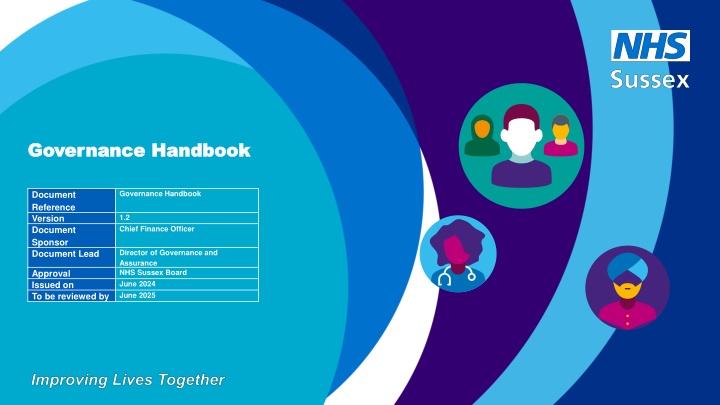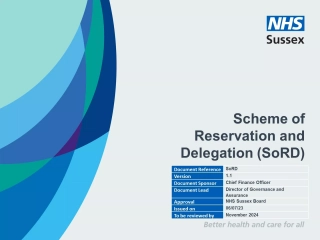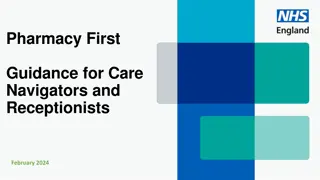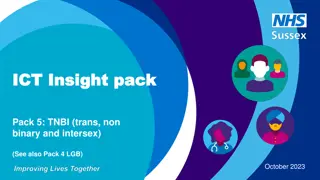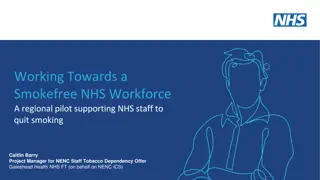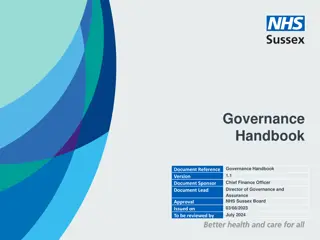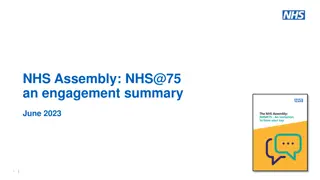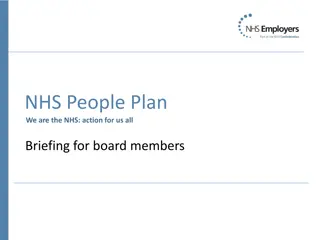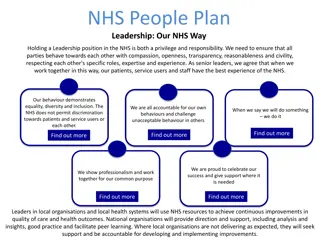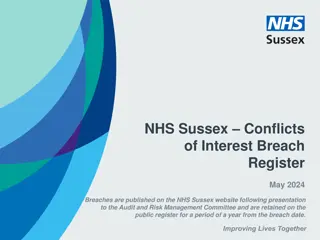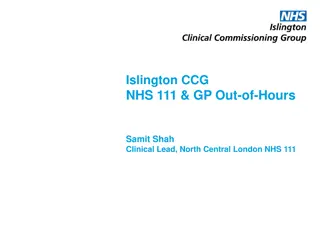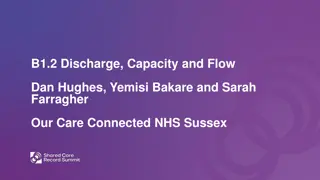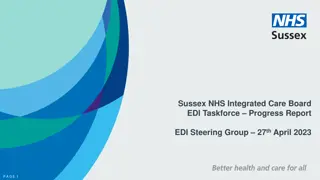NHS Sussex Governance Handbook Overview
This content provides an overview of the governance handbook for NHS Sussex, outlining the purpose of the handbook, NHS core values, and the importance of good corporate governance in protecting patients and public funds. It explains how the handbook supports the NHS Sussex Constitution and includes key documents and policies for effective governance.
Download Presentation

Please find below an Image/Link to download the presentation.
The content on the website is provided AS IS for your information and personal use only. It may not be sold, licensed, or shared on other websites without obtaining consent from the author.If you encounter any issues during the download, it is possible that the publisher has removed the file from their server.
You are allowed to download the files provided on this website for personal or commercial use, subject to the condition that they are used lawfully. All files are the property of their respective owners.
The content on the website is provided AS IS for your information and personal use only. It may not be sold, licensed, or shared on other websites without obtaining consent from the author.
E N D
Presentation Transcript
Governance Handbook Governance Handbook Governance Handbook Document Reference Version Document Sponsor Document Lead 1.2 Chief Finance Officer Director of Governance and Assurance NHS Sussex Board June 2024 Approval Issued on To be reviewed by June 2025
Contents Contents Section 1 Introduction and Overview Section 2 ICS Governance Framework Section 3 - The Integrated Care Partnership Sussex Health & Care Assembly Section 4 - The Integrated Care Board NHS Sussex Section 5 NHS Sussex Executive Structures Section 6 System Governance Arrangements Section 7 Place-based Partnerships Section 8 NHS Provider Collaboratives Section 9 Primary medical services and other commissioning responsibilities delegated to NHS Sussex
Section 1 Section 1 Introduction and Overview Introduction and Overview 1.1 Purpose of the Handbook 1.2 NHS Core Values 1.3 The Nolan Principles 1.4 How the NHS Sussex Board will operate
1.1 Purpose of the Handbook 1.1 Purpose of the Handbook This Governance Handbook brings together a range of documents which supports the NHS Sussex Constitution and promotes good corporate governance. Corporate governance regulates the power and decision making of the people who have been given responsibility for the stewardship of public assets and healthcare services. In NHS Sussex good corporate governance will protect both patients and public funds. It exists to ensure that decision-making is lawful, statutory duties and wider legal, regulatory duties are met, and that decision-making is enhanced from a quality and scrutiny perspective. This Handbook sets out in detail the corporate governance arrangements that will support the implementation of the NHS Sussex Constitution. It contains overviews of and links to relevant practical procedural documents for applying the Constitution, including the Terms of Reference for NHS Sussex Board Committees, the Scheme of Reservation and Delegation, the Functions and Decision Map, Standing Financial Instructions and other key policy documents. In short, it is a collection of key documents and underpinning policies, designed to promote good corporate governance. If there is any ambiguity between the NHS Sussex Constitution and this Handbook, the interpretation in the Constitution will apply.
1.2 NHS Core Values 1.2 NHS Core Values The NHS Core Values, are set out in the NHS Constitution: Respect and dignity: We value each person as an individual, respect their aspirations and commitments in life, and seek to understand their priorities, needs, abilities and limits. We take what others have to say seriously. We are honest about our point of view and what we can and cannot do. Improving lives: We strive to improve health and well-being and people s experiences of the NHS. We value excellence and professionalism wherever we find it in the everyday things that make people s lives better as much as in clinical practice, service improvements and innovation. Commitment to quality of care: We earn the trust placed in us by insisting on quality and striving to get the basics right every time: safety, confidentiality, professional and managerial integrity, accountability, dependable service and good communication. We welcome feedback, learn from our mistakes and build on our successes. Working together for patients: We put patients first in everything we do, by reaching out to staff, patients, carers, families, communities, and professionals outside the NHS. We put the needs of patients and communities before organisational boundaries. Everyone counts: We use our resources for the benefit of the whole community, and make sure nobody is excluded or left behind. We accept that some people need more help, that difficult decisions have to be taken and that when we waste resources we waste the opportunities of others. We recognise that we all have a part to play in making ourselves and our communities healthier. Compassion: We respond with humanity and kindness to each person s pain, distress, anxiety or need. We search for the things we can do, however small, to give comfort and relieve suffering. We find time for those we serve and work alongside. We do not wait to be asked, because we care.
1.3 The Nolan Principles 1.3 The Nolan Principles The Committee on Standards in Public Life (Nolan Committee) set out in 1995 seven principles of public life which should apply to all in public service (The First Report of the Committee on Standards in Public Life, 1995). These principles have been adopted as the basis for working practices within NHS Sussex. It is intended that all our staff and all members of the NHS Sussex Board, will recognise and uphold them at all times. Selflessness: Holders of public office should act solely in terms of the public interest. Accountability: Holders of public office are accountable to the public for their decisions and actions and must submit themselves to the scrutiny necessary to ensure this. Integrity: Holders of public office must avoid placing themselves under any obligation to people or organisations that might try inappropriately to influence them in their work. They should not act or take decisions in order to gain financial or other material benefits for themselves, their family, or their friends. They must declare and resolve any interests and relationships. Openness: Holders of public office should act and take decisions in an open and transparent manner. Information should not be withheld from the public unless there are clear and lawful reasons for so doing. Honesty: Holders of public office should be truthful. Objectivity: Holders of public office must act and take decisions impartially, fairly and on merit, using the best evidence and without discrimination or bias. Leadership: Holders of public office should exhibit these principles in their own behaviour. They should actively promote and robustly support the principles and be willing to challenge poor behaviour wherever it occurs.
1.4 How the NHS Sussex Board will operate 1.4 How the NHS Sussex Board will operate The Board of NHS Sussex has agreed that it will operate according to the following principles: mutual respect for the professional expertise, statutory responsibilities, internal accountabilities and approval processes of each partner organisation willing to collaborate to find mutually acceptable solutions that improve the outcomes, access or experience for the users of our services an inclusive approach where contributions are sought pro-actively from multiple contacts within partner organisations and within the diverse communities we serve act with integrity, listen to different opinions and make decisions based on data, with an understanding of the impact this will have on the patients and users of our services. ambitious about the opportunities for innovation, change and improvement at every level of the health and care system
Section 2 Section 2 ICS Governance Framework ICS Governance Framework 2.1 Statutory Framework for Integrated Care Systems 2.2 The purpose of Integrated Care Systems 2.3 The Sussex Health and Care System 2.4 Sussex Health and Care System Functions and Decisions Map
2.1 Statutory Framework for Integrated Care Systems 2.1 Statutory Framework for Integrated Care Systems Integrated Care Systems (ICSs) are partnerships of organisations that come together to plan and deliver joined up health and care services, and to improve the lives of people who live and work in their area. Following the Health and Care Act (2022), 42 ICSs were established across England on a statutory basis on 1 July 2022. Each ICS will include: an Integrated Care Partnership (ICP) a statutory committee jointly formed between the NHS Integrated Care Board and all upper-tier local authorities that fall within the ICS area. The ICP brings together a broad alliance of partners concerned with improving the care, health and wellbeing of the population, with membership determined locally. The ICP is responsible for producing an integrated care strategy on how to meet the health and wellbeing needs of the population in the ICS area. within each ICS, place-based partnerships lead the detailed design and delivery of integrated services across their localities and neighbourhoods. The partnerships involve the NHS, local councils, community and voluntary organisations, local residents, people who use services, their carers and representatives and other community partners with a role in supporting the health and wellbeing of the population. provider collaboratives bring providers together to achieve the benefits of working at scale across multiple places and one or more ICSs, to improve quality, efficiency and outcomes and address unwarranted variation and inequalities in access and experience across different providers an Integrated Care Board (ICB) a statutory NHS organisation responsible for developing a plan for meeting the health needs of the population, managing the NHS budget and arranging for the provision of health services in the ICS area. local authorities in the ICS area, which are responsible for social care and public health functions as well as other vital services for local people and businesses
2.2 The purpose of Integrated Care Systems 2.2 The purpose of Integrated Care Systems The purpose of Integrated Care Systems (ICSs) is to bring partner organisations together to: Improve outcomes in population health and healthcare Tackle inequalities in outcomes, experience and access enhance productivity and value for money Help the NHS support broader social and economic development. Collaborating as ICSs will help health and care organisations tackle complex challenges, including: Improving the health of children and young people Supporting people to stay well and independent Acting sooner to help those with preventable conditions Supporting those with long-term conditions or mental health issues Caring for those with multiple needs as populations age Getting the best from collective resources so people get care as quickly as possible.
2.3 The Sussex Health and Care System 2.3 The Sussex Health and Care System The Sussex ICS, or the Sussex Health and Care Partnership as it has been known, covers the geographical footprint of the three local authorities in Brighton & Hove, East Sussex and West Sussex. Details of Sussex Health and Care providers are available on our website here: Sussex Health and Care - NHS Sussex (ics.nhs.uk). In Sussex, a conscious decision has been taken to replace the three letter acronyms in the Health & Care Act with names that are more descriptive of the purpose of each component part of the new governance arrangements in Sussex: The ICS is known as the Sussex Health & Care System or thesystem The ICP is known as the Sussex Health & Care Assembly The ICB is known as NHS Sussex
2.5 Sussex Health & Care System Functions and Decisions Map 2.5 Sussex Health & Care System Functions and Decisions Map
Section 3 Section 3 The Integrated Care Partnership The Integrated Care Partnership Sussex Health & Care Assembly Assembly Sussex Health & Care 3.1 Sussex Health & Care Assembly core purpose 3.2 Sussex Integrated Care Strategy
3.1 Sussex Health & Care Assembly 3.1 Sussex Health & Care Assembly core purpose core purpose The Sussex Health & Care Assembly is jointly established by NHS Sussex, Brighton & Hove City Council, East Sussex County Council and West Sussex County Council as a Joint Committee in accordance with the Constitutions of each statutory organisation. Core purpose:to agree the strategic direction and facilitate joint action across a broad alliance of organisations to improve the outcomes, equality of access and patient experience of health and care services for all communities across Sussex. Key decisions made by the Sussex Health & Care Assembly include: - approval of an integrated care strategy for Sussex, built from the three health and wellbeing strategies for each of our places - approval of the next iteration of the Sussex 2025 Vision when it needs updating - approval of a consistent and prioritised list of health and care needs across Sussex The Sussex Health & Care Assembly will meet in public at least two times per year and will be chaired by an Independent Chair appointed by the four statutory partners. The conclusions from each meeting of the Sussex Health & Care Assembly will be reported to NHS Sussex and the Health & Wellbeing Board of each local authority. Terms of reference for the Sussex Health & Care Assembly
3.2 Sussex Integrated Care Strategy 3.2 Sussex Integrated Care Strategy Section 116ZB of the Health & Care Act confers a responsibility upon the Sussex Health & Care Assembly to develop an integrated care strategy for our whole population using best available evidence and data, covering health and social care (both children s and adult s social care), and addressing the wider determinants of health and wellbeing. The strategy sets out how the assessed needs of our population are to be met by the exercise of functions of NHS Sussex, NHS England, or the responsible local authorities whose areas coincide with or fall wholly or partly within its area. In consultation with local partners, NHS Sussex has produced a five-year plan (updated annually) for how NHS services will be delivered to meet local needs. In developing this plan and carrying out their work, NHS Sussex must have regard to the integrated care strategy and be informed by the joint health and wellbeing strategies published by the Health and Wellbeing Boards in their area. Details of our Sussex Health and Care Strategy: Improving Lives Together is available on our website here: Our strategy - Sussex Health & Care (ics.nhs.uk)
Section 4 Section 4 The Integrated Care Board The Integrated Care Board NHS Sussex NHS Sussex 4.1 NHS Sussex core purpose 4.7 NHS Sussex Corporate Governance Framework - key documents Constitution Scheme of Reservation & Delegation (SoRD) Standing Financial Instructions Standing Orders Key Policy Documents 4.2 NHS Sussex membership 4.3 NHS Sussex statutory duties 4.4 NHS Sussex statutory functions 4.8 NHS Sussex Key Roles and Responsibilities 4.5 NHS Sussex delegated direct commissioning functions 4.9 Role of NHS Sussex Board Assurance Committees 4.6 Supra-ICS governance arrangements
4.1 NHS Sussex 4.1 NHS Sussex core purpose (1 of 2) core purpose (1 of 2) NHS Sussex took on the functions of the three Sussex Clinical Commissioning Groups (CCGs) on 1 July 2022, as well as a broader strategic responsibility for overseeing joined-up health and care delivery across Sussex. Core purpose: to agree the strategic priorities and resource allocation for all NHS organisations in Sussex, and then lead the improvement and integration of high-quality health and care services for all communities across Sussex. Key decisions made by NHS Sussex will include: approval of the NHS Sussex five-year delivery plan to address the prioritised health needs and integrated care strategy agreed by the Sussex Health & Care Assembly approval of the strategic commissioning arrangements for acute, community health, mental health, primary care and urgent care services in Sussex approval of the resource allocation for each NHS provider of acute, community health, mental health, primary care and urgent care services in Sussex approval of major system-wide investment programmes to integrate and transform health and care services across Sussex constructive support and challenge of the NHS Sussex Chief Executive Officer and Executive Committee on the actions being taken to deliver the strategic objectives and financial performance of NHS Sussex NHS Sussex will meet in public at least six times per year and will be chaired by the Chair of NHS Sussex. NHS Sussex will be supported by five Board Assurance Committees and an Executive Committee .
4.1 NHS Sussex 4.1 NHS Sussex core purpose (2 of 2) core purpose (2 of 2) NHS Sussex Integrated Care Board Quality and Patient Experience Committee People and Digital Committee Sussex NHS Committee-in- Common Finance and Outcomes Committee Audit and Risk Management Committee Remuneration Committee Executive Committee Commissioning Group Integrated Assurance Group Culture Group Assurance Committees Exercising executive functions
4.2 NHS Sussex 4.2 NHS Sussex membership membership Chair of Board Chair of Audit and Risk Management Committee Chair of Remuneration Committee Chair of Quality and Patient Experience Committee Chair of Finance and Outcomes Committee (and Senior Independent Member and Board Deputy Chair) Chair of People and Digital Committee Non-Executive Director Stephen Lightfoot Paul King Faustina Bayo Susan Marshall Executive and Non-Executive Directors of the NHS Sussex Board have been appointed through an open and competitive recruitment process in line with national guidelines. The Partner Members were appointed by an Appointments Panel which set out a role specification, requested nominations from the membership of each professional group, considered the nominations received and made the appointment decision. 7 x Non-Executive Directors Louise Ansari Rahul Jaitly Monica Fletcher The Chief Executive Officer The Chief Medical Officer The Chief Nursing Officer The Chief Integration and Primary Care Officer The Chief Finance Officer The Chief Delivery and Strategy Officer The Chief People Officer General Practitioner Chair or CEO of NHS Provider Mental Health Member Director of Public Health* Director of Adult Social Services* Director of Children Services* Adam Doyle James Ramsay Allison Cannon Amy Galea Hannah Hamilton Claudia Griffith Mark Smith Dr Ragu Rajan Joe Chadwick-Bell Jane Padmore Caroline Vass Mark Stainton Vince Clark 7 x Executive Directors * Each Local Authority in Sussex nominates the member for one of these three roles 6 x Partner Members
4.3 NHS Sussex 4.3 NHS Sussex statutory duties statutory duties 1 8 Duty to promote NHS Constitution Duty to promote innovation 2 9 Duty as to effectiveness, efficiency etc Duty in respect of research 3 10 Duty as to improvement in quality of services Duty to promote education and training 4 11 Duties as to reducing inequalities Duty to promote integration 5 12 Duty to promote involvement of each patient Duty to have regard to wider effect of decisions 6 13 Duty as to patient choice Duties as to climate change etc 7 Duty to obtain appropriate advice
4.4 NHS Sussex statutory functions 4.4 NHS Sussex statutory functions
4.5 NHS Sussex delegated direct commissioning functions 4.5 NHS Sussex delegated direct commissioning functions In accordance with its statutory powers under section 65Z5 of the NHS Act, NHS England has delegated the exercise of certain delegated functions to NHS Sussex to empower it to commission a range of services for the people of Sussex. These delegated functions are the functions are as follows: Primary medical services Primary dental services and Prescribed Dental Services Primary ophthalmic services Pharmaceutical services and local pharmaceutical services Further information about primary medical services can be found later in this document.
4.6 Supra 4.6 Supra- -ICS governance arrangements ICS governance arrangements To deliver some of its functions NHS Sussex needs to work together with other ICBs; for example, commissioning more specialised services, emergency ambulance services and other services where relatively small numbers of providers serve large populations, and when working with providers that span multiple ICSs or operate through clinical networks. The governance arrangements to support these joint working arrangements are known as supra-ICS and are co-designed between the parties that will be working together. NHS Sussex participates in the following supra-ICS governance arrangements: Single Virtual Contact Centre (SVCC) Committees in Common Pharmacy, Optometry and Dentistry (POD) Committees in Common Current levels of NHS111 performance are significantly challenged and there is an immediate need to act faster to ensure that it remains a credible service for patients. NHS Sussex and other ICSs are working together to accelerate mobilisation of the Single Virtual Contact Centre (SVCC). The SVCC Committees in Common exists to provide direction to the SVCC; it will monitor progress against the business case and plan, support the resolution of escalated risks and issues and review and approve requests for change. The six Integrated Care Boards across the South East have taken on the delegated responsibility for decision-making in relation to Pharmacy, Optometry and Dentistry (POD) as of July 2022. These six ICBs have determined they will work collaboratively during 2022/2023, to discharge their delegated commissioning responsibility for the delivery of POD services. The Committees in Common approach is being employed to allow organisations to take aligned decisions together on programmes that cross organisational/geographical boundaries.
NHS Sussex Corporate Governance Framework NHS Sussex Corporate Governance Framework key documents (1 of 4) of 4) key documents (1 There are a number of key documents which form the core of the NHS Sussex corporate governance framework. These are its: Constitution Scheme of Reservation & Delegation (SoRD) Standing Financial Instructions Standing Orders Key Policy Documents The following slides provide a brief summary of the purpose of each document and links to that document.
4.7 Corporate Governance Framework 4.7 Corporate Governance Framework key documents (2 of 4) key documents (2 of 4) Constitution The NHS Sussex Constitution articulates the fundamental principles underpinning the way in which it will operate. It sets out the authority with which NHS Sussex can act and how it will organise itself to exercise its functions. NHS Sussex will review its constitution each year to make sure that it remains appropriate (although amendments can also be made outside this annual review process). Any proposed amendments will be considered by the Board of NHS Sussex before being submitted to NHS England for final approval. NHS Sussex has committed to taking account of the views of its partners before asking NHS England to approve its constitution. Access the NHS Sussex Constitution Also available is a concise summary of the key aspects of the NHS Sussex Constitution for ease of reference. It does not replace the Constitution and reference should always be made to the Constitution to resolve detailed queries. Scheme of Reservation & Delegation (SoRD) To be clear about what has and hasn t been delegated, NHS Sussex has agreed a Scheme of Reservation & Delegation (SoRD). The SoRD sets out: those functions that are reserved to the Board; those functions that have been delegated to an individual or to committees and sub-committees of the ICB; those functions delegated to another body or to be exercised jointly with another body, under section 65Z5 and 65Z6 of the 2006 Act. Access the NHS Sussex Scheme of Reservation and Delegation (SoRD)
4.7 Corporate Governance Framework 4.7 Corporate Governance Framework key documents (3 of 4) key documents (3 of 4) Standing Financial Instructions The Board has agreed a set of Standing Financial Instructions (SFIs) which include the delegated limits of financial authority set out in the SoRD. SFIs are designed to ensure regularity and propriety of financial transactions. SFIs define the purpose, responsibilities, legal framework and operating environment of NHS Sussex. Access the NHS Sussex Standing Financial Instructions Standing Orders To make sure that the right processes are followed in carrying out its functions, the Board has agreed a set of Standing Orders (which are appended to its Constitution). The Standing Orders set out clear procedures for conducting the business of Board and other key meetings. They cover how meetings should be convened and chaired; how the agendas and supporting papers should be drawn up and circulated; how decisions should be taken; and how they should be recorded.
4.7 Corporate Governance Framework 4.7 Corporate Governance Framework key documents (4 of 4) (4 of 4) Policy for the Development of Procedural Documents This policy provides definitions of the different types of conflicts of interest which exist (financial, non- financial professional, non-financial personal, and indirect interests). It also highlights the roles and responsibilities of key individuals within NHS Sussex with regard to the management of conflicts of interest. key documents Conflicts of Interest Policy Standards of Business Conduct Policy This policy, which should be read in conjunction with the Conflicts of Interest Policy, sets out the arrangements that will be made to ensure the highest standards of corporate behaviour and responsibility from NHS Sussex Board members, staff and decision-making groups. This policy provides a definition of the different procedural documents within NHS Sussex and it sets out the template to be adopted for NHS Sussex policies. It sets out how new procedural documents should be developed and the approach to be taken to amending/reviewing them. It highlights requirements in relation to impact assessments and the development of implementation plans to support strategies and policies. It also sets out consultation requirements to be fulfilled in advance of seeking approval for strategies and policies. It indicates NHS Sussex expectations in relation to declarable interests, charitable collections, political activities and personal conduct (including corporate responsibilities, use of social media, confidentiality, gambling, lending and borrowing, trading on official NHS premises, insolvency and arrest or conviction). It dictates the actions to be taken in identifying, declaring and reviewing interests. It also sets out how information about interests will be published or withheld. It sets out how interests should be managed within meetings. It also explains the type of interests that should be declared (loyalty, gifts, hospitality, meals and refreshments, travel and accommodation, outside employment, shareholdings, patents, donations, clinical private practice). Arrangements to be made in relation to sponsorship and joint working are also included in the policy, as well as procurement and contract monitoring. It sets out how to raise concerns about breaches of the policy and the implications of failure to comply with the policy. The policy sets out the approval routes for NHS Sussex procedural documents. It sets out how to raise concerns about breaches of the policy and the implications of failure to comply with the policy. It also sets out training requirements associated with the policy.
4.8 NHS Sussex Key Roles and Responsibilities 4.8 NHS Sussex Key Roles and Responsibilities There are a number of key roles which NHS Sussex is required to appoint, either to comply with legislation or relevant guidance from NHS England or other bodies. Information about these roles can be found below: Non-executive member (NED) Board champion roles:- Board executive nominated roles:- Executive nominated roles:- Executive lead for Equality, Diversity and Inclusion Mark Smith Executive lead for Freedom to Speak Up Mark Smith Executive lead for Children Claudia Griffiths Accountable Emergency Officer Claudia Griffiths Executive lead for special educational needs and disability (SEND) James Ramsay Health and Safety Lead Hannah Hamilton Infection Prevention and Control (IPC) Lead Allison Cannon Executive lead for learning disability and autism (all-age) - Amy Galea Executive lead for Down s syndrome (all-age) James Ramsay Executive lead for safeguarding (all-age), including looked after children and care leavers Allison Cannon Executive lead for social and economic development Amy Galea Deputy Chair and Senior Independent Director Louise Ansari Conflict of Interest Guardian Paul King NED Champion for Equality, Diversity and Inclusion Faustina Bayo NED Champion for Freedom to Speak Up Sue Marshall NED Champion for Emergency Planning, Preparedness and Resilience Stephen Lightfoot NED Champion for Environmental Sustainability Rahul Jaitly NED Champion for Research and Innovation Monica Fletcher Member with responsibility for special educational needs and disability (SEND) and Mental Health James Ramsay Member with responsibility for Safeguarding of Children and Young People Allison Cannon Senior Information Risk Owner (SIRO) Hannah Hamilton Caldicot Guardian Allison Cannon
4.9 The role of Board Assurance Committees 4.9 The role of Board Assurance Committees NHS Sussex has established a number of Board Assurance Committees to support the Board and the Executive in fulfilling their responsibilities by reviewing the comprehensiveness, reliability and integrity of assurances. These Committees are: Sussex NHS Committee-in-Common - which focuses on system service redesign, our shared delivery plan, and new models of care within sustainable and finite financial envelope. Audit and Risk Management Committee which provides oversight and seeks assurance to the NHS Sussex Board on the adequacy of governance, risk management and internal control processes within NHS Sussex Remuneration Committee which is responsible for approving the remuneration and pay frameworks for all NHS Sussex employees and Board Members (excluding the NHS Sussex Chair whose remuneration is determined by NHS England). Finance and Outcomes Committee which provides oversight and seeks assurance on how well we are using our NHS Sussex financial resources and strategic commissioning responsibilities to improve health outcomes and reduce health inequalities for the population of Sussex. People and Digital Committee which provides oversight and seeks assurance on the delivery of our NHS Sussex and the Sussex Health and Care System people, digital and data plans. Quality and Patient Experience Committee which provides oversight and seeks assurance that patients are receiving safe, high- quality, evidence based, effective and timely healthcare with equal access to services and seamless handovers and integration between different parts of the Sussex health and care system. Executive Committee which supports the Chief Executive Officer (CEO) of NHS Sussex in the discharge of their executive functions and provides oversight and seeks assurance on provider oversight activities and decisions. Each Board Assurance Committees has an agreed Terms of Reference which outlines their specific remit and membership, available on our NHS Sussex website here: Committees - Sussex Health & Care (ics.nhs.uk)
Section 5 Section 5 - - NHS Sussex Executive Structures NHS Sussex Executive Structures Principles informing NHS Sussex Executive Governance Executive decision-making authority is delegated from the NHS Sussex Board to the CEO. The CEO can choose to delegate some of their authority to individual executives. For those functions which the CEO has reserves to themselves, they have also chosen to exercise most of their delegated functions through the Executive Committee (ExCo). In this respect ExCo will be the only executive group that has full delegated decision-making authority from the Board (via the CEO s delegations). Delegations by the CEO to individual directors are expressed as things each director can determine independently. Full detail of matters reserved to the Board and those that are delegated to the CEO, or an individual director, are set out in the NHS Sussex Scheme of Reservation and Delegation (SoRD) as outlined earlier in this document. Executive Sub-groups The Executive Committee (ExCo) has established sub-groups to support fulfilling its responsibilities by reviewing and reporting to the ExCo on the comprehensiveness, reliability and integrity of assurances. These Sub-groups are: Integrated Assurance Group - which considers the breadth of assurance material through provider assurance xxxx Commissioning Group which supports the ExCo in ensuring the NHS Sussex Board s commissioning and contracting functions are discharged effectively, in accordance with the resources allocated by the Board, and enhances productivity and value for money. Culture Group which supports the ExCo in providing oversight, seeking assurance and priority setting in relation to organisational development; design, retention, culture, learning and capability of NHS Sussex.
Section 6 Section 6 System Governance Arrangements System Governance Arrangements 6.1 NHS Sussex System-level responsibilities 6.2 System Forums 6.3 System Assurance Framework
6.1 NHS Sussex System 6.1 NHS Sussex System- -level responsibilities Developing a plan to meet the health needs of the population within the Sussex area. Allocating resources to deliver the plan across the Sussex Health and Care System. Establishing joint working arrangements with partners that embed collaboration as the basis for delivery of joint priorities within the plan. Establishing governance arrangements to support collective accountability between partner organisations for whole-system delivery and performance, underpinned by the statutory and contractual accountabilities of individual organisations, to ensure the plan is implemented effectively within a system financial envelope set by NHS England and NHS Improvement. Arranging for the provision of health services in line with the allocated resources across the Sussex Health and Care System. Leading system implementation of the People Plan by aligning partners across the Sussex health and Care System to develop and support the one workforce , including through closer collaboration across the health and care sector, and with local government, the voluntary and community sector and volunteers. Leading system-wide action on data and digital: ICS NHS bodies will work with partners across the NHS and with local authorities to put in place smart digital and data foundations to connect health and care services and ultimately transform care to put the citizen at the centre of their care Using joined-up data and digital capabilities to understand local priorities, track delivery of plans, monitor and address variation and drive continuous improvement in performance and outcomes. Working alongside councils to invest in local community organisations and infrastructure and, through joint working between health, social care and other partners including police, education, housing, safeguarding partnerships, employment and welfare services, ensuring that the NHS plays a full part in social and economic development and environmental sustainability. Driving joint work on estates, procurement, supply chain and commercial strategies to maximise value for money across the system and support these wider goals of development and sustainability Planning for, responding to and leading recovery from incidents (EPRR), to ensure NHS and partner organisations are joined up at times of greatest need, including taking on incident coordination responsibilities as delegated by NHS England and NHS Improvement. Functions NHS England and NHS Improvement will be delegating including commissioning of primary care and appropriate specialised services. level responsibilities
6.2 System Forums 6.2 System Forums In Sussex, we have established system forums to bring together the NHS and key partners. These are as follows: Sussex Health and Care Partnership Executive - which brings together CEOs and other key NHS system leaders to ensure system co-ordination to support delivery of our strategy. It reports into the NHS Sussex Committee in Common as the forum to enable NHS collaboration and to the Sussex Health and Care Assembly as the forum to enable partnership between NHS, Local Government and other organisations in Sussex NHS Sussex Delivery Group which consolidates activity to oversee in-year system delivery in one place. It brings together the ICB and providers to stocktake cross-cutting progress against performance, quality, people, finance, outcomes and digital matters.
6.3 System Assurance Framework 6.3 System Assurance Framework NHS Sussex has developed a System Assurance Framework which sets out the arrangements in place to provide assurance that the Sussex Health and Care System is delivering its system responsibilities. Oversight on each theme in the NHS Oversight Framework has been embedded within an executive and board assurance element of the governance model for NHS Sussex. In addition, each theme within the Oversight Framework has an executive owner within the NHS Sussex Chief Officer team, and has been mapped to a specific system/provider assurance interaction as per the below:- Oversight Framework Theme NHS Sussex Responsible Executive Committee NHS Sussex Board Assurance Committee System assurance oversight NHS Sussex Responsible Executive Integrated Assurance Group Quality and Patient Experience Committee Quality Governance and Improvement Group Chief Nursing Officer Quality, access and outcomes Executive Committee Finance and Outcomes Committee Provider Assurance Meetings Chief Medical Officer Preventing ill health and reducing inequalities Executive Committee People and Digital Committee Provider Assurance Meetings Chief Executive Officer Leadership and capability Executive Committee People and Digital Committee Provider Assurance Meetings Chief People Officer People Integrated Assurance Group Finance and Outcomes Committee Finance Leadership Group Chief Finance Officer Finance and use of resources Executive Committee Varies Varies Chief Delivery and Strategy Officer Local strategic priorities A Memorandum of Understandinghas also been developed with NHS England which sets out the principles, describes the relationships and the key interfaces between the ICB and NHSE that underpin how the ICB and NHSE will work together to discharge their duties.
Section 7 Section 7 - - Place Place- -based Partnerships based Partnerships 7.1 Principles informing how NHS Sussex will work at and with place 7.2 Brighton & Hove / East Sussex / West Sussex Health & Care Partnerships
7.1 Principles informing how NHS Sussex will work at and with 7.1 Principles informing how NHS Sussex will work at and with place place The three place-based Health & Care Partnerships in Sussex are collaborative and non-statutory arrangements where all the organisations responsible for planning commissioning and delivering health and care services for the populations in that geographical area work together. In collaborating at place, individual statutory organisations are responsible for agreeing decisions relating to their budgets and services according to their existing practice and processes. The Joint Strategic Needs Assessments and the Health and Wellbeing Strategies agreed through the three Health and Wellbeing Boards set the evidence base and strategic framework within which priorities at place are identified. Place-based planning, commissioning and delivery will be focussed on a clear scope of services aimed at integrating care, improving health and reducing health inequalities. Wider partners in the voluntary, community, social enterprise (VCSE) and independent care sector, and Borough and District Councils where applicable, will be engaged to mobilise and support the best use of the resources collectively available. At a pan-ICS level, the Sussex Health and Care Assembly will be responsible for producing the Integrated Care Strategy for the system. This high-level strategy will reflect the priorities in, and be built from, the three Health and Wellbeing Strategies. NHS Sussex is required to develop and implement a Delivery Plan that delivers the Assembly s Integrated Care Strategy. The principle of subsidiarity is paramount NHS Sussex s Delivery Plan will be implemented through the three place- based Health and Care Partnerships, unless there is collective agreement that it makes more sense to deliver an element at the pan-Sussex level. NHS Sussex will align resources and management capacity to support the three place-based Health and Care Partnerships to implement the Delivery Plan Effective delivery at place therefore requires the full involvement of local authority partners in the development of NHS Sussex s Delivery Plan and other key related decisions before those decisions are taken by the NHS Sussex Board or its executive.
7.2 Brighton & Hove / East Sussex / West Sussex Health & Care 7.2 Brighton & Hove / East Sussex / West Sussex Health & Care Partnerships Partnerships The composition of each place-based Health & Care Partnership will vary according to the needs of the local population and the partners involved in delivering health and care services in that geography. However, each place-based partnership should be set up to meet the following requirements: A Lead Executive for the place-based partnership will be jointly appointed by the Chief Executive Officer of NHS Sussex and the Chief Executive Officer of the Local Authority following an open and competitive recruitment process. The Lead Executive will then be jointly accountable to the two Chief Executives for delivering the agreed annual objectives and service/pathway improvements in that place. A Lead Clinician for the place-based partnership will be appointed by the Chief Medical Officer and Chief Nursing Officer of NHS Sussex to provide the clinical and professional leadership for pathway and service redesign in that place. An Executive Partnership Leadership Team will be set up and chaired by the Lead Executive with senior executive representatives from each major health and care provider in that place who have the authority to make funding and delivery commitments on behalf of their organisation. The NHS Sussex Chief Delivery Officer (or their nominee) and one of the NHS Sussex Non-Executive Directors will also become members of each Partnership Leadership Team to support the alignment of strategies across the system and to share best practice or experiences from other places. A Partnership Consultative Group will be set up and chaired by the Lead Executive with as many representatives and stakeholders from the health and care sector in that place as required.
Section 8 Section 8 NHS Provider Collaboratives NHS Provider Collaboratives Three NHS Care Collaborative Networks were established under the previous governance arrangements to facilitate Sussex-wide working and help improve the quality of services in: Community Care Acute Care Primary Care Provider Collaboratives are intended to be the way in which healthcare providers in Sussex, formally come together to deliver the ambitions of our strategy, Improving Lives Together. These Care Collaboratives do not form part of the formal governance or accountability structure in the new Sussex Health and Care System but there will be a need to continue to ensure coordination and collaboration around core services, complementing the responsibilities of the place-based partnerships, which are critical for the development and delivery of more integrated health and care services.
Section 9 Section 9 Primary medical services and other commissioning Primary medical services and other commissioning responsibilities delegated to NHS Sussex responsibilities delegated to NHS Sussex 9.1 Primary medical services 9.2 List of providers of primary medical services in Sussex 9.3 Primary Care Networks 9.4 Primary care specific forums supporting NHS Sussex decision-making
9.1 Primary medical services 9.1 Primary medical services Primary medical services provide the first point of contact in the healthcare system, acting as the front door of the NHS. In accordance with its statutory powers under section 65Z5 of the NHS Act, NHS England has delegated to NHS Sussex the authority to commission the following range of services for the people of Sussex: Primary medical services; Primary dental services and prescribed dental services; Primary ophthalmic services; Pharmaceutical services and local pharmaceutical services. As a system, we look to primary care to lead on improving the whole person health of a local population. Strengthening primary care and developing integrated neighbourhood teams, is central to supporting NHS Sussex s fundamental shift from health care delivery focused on treating disease towards person-centred support to people facing the challenges of everyday life; in turn strengthening social cohesion and encouraging greater resilience. This will be primary care s core role as we move from Clinical Commissioning Groups to an Integrated Care System a shift from general practice as commissioners to general practice as providers, working through Primary Care Networks as vehicles for delivery, as stated in the NHS s Long-Term Plan and the five-year framework for the GP contract, published in January 2019.
9.2a List of providers of primary medical services in Sussex 9.2a List of providers of primary medical services in Sussex (Brighton & Hove) (Brighton & Hove) Practice Name PORTSLADE HEALTH CENTRE PRESTON PARK SURGERY REGENCY SURGERY SALTDEAN AND ROTTINGDEAN MED PRACTICE SCHOOL HOUSE SURGERY SEVEN DIALS MEDICAL CENTRE SHIP STREET SURGERY - Brighton ST. PETER'S MEDICAL CENTRE STANFORD MEDICAL CENTRE THE AVENUE SURGERY THE HAVEN PRACTICE TRINITY MEDICAL CENTRE UNIVERSITY OF SUSSEX HEALTH CENTRE WARMDENE SURGERY WELLSBOURNE HEALTHCARE CIC WISH PARK SURGERY WOODINGDEAN MEDICAL CENTRE Practice Name ARCH HEALTHCARE ARDINGLY COURT SURGERY BEACONSFIELD MEDICAL PRACTICE BENFIELD VALLEY HEALTHCARE HUB BRIGHTON HEALTH AND WELLBEING CENTRE BRIGHTON STATION HEALTH CENTRE BROADWAY SURGERY CARDEN SURGERY CHARTER MEDICAL CENTRE HOVE MEDICAL CENTRE LINKS ROAD SURGERY MILE OAK MEDICAL CENTRE MONTPELIER SURGERY PARK CRESCENT HEALTH CENTRE PAVILION SURGERY
9.2b List of providers of primary medical services in Sussex (East 9.2b List of providers of primary medical services in Sussex (East Sussex) Sussex) Practice Name Practice Name Practice Name ARLINGTON ROAD SURGERY ASHDOWN FOREST HEALTH CENTRE BEACON SURGERY BEACONSFIELD ROAD SURGERY BIRD-IN-EYE SURGERY BRIDGESIDE SURGERY BUXTED MEDICAL CENTRE CARISBROOKE SURGERY CHAPEL STREET SURGERY COLLINGTON SURGERY DOWNLANDS MEDICAL CENTRE FAIRFIELD SURGERY FERRY ROAD HEALTH CENTRE FOUNDRY HEALTHCARE LEWES GROOMBRIDGE AND HARTFIELD MEDICAL GROUP GROVE ROAD SURGERY HAILSHAM MEDICAL GROUP HARBOUR MEDICAL PRACTICE HAROLD ROAD SURGERY HASTINGS OLD TOWN SURGERY HAVENSHEALTH HEATHFIELD SURGERY HERSTMONCEUX INTEGRATIVE HEALTH CENTRE HIGH GLADES MEDICAL CENTRE MANOR PARK MEDICAL CENTRE MARTINS OAK SURGERY MID DOWNS MEDICAL PRACTICE NORTHIAM & BROAD OAK SURGERIES OLD SCHOOL SURGERY LITTLE COMMON & OLD TOWN SURGERIES OLDWOOD SURGERY PARK PRACTICE PRINCESS PARK HEALTH CENTRE PRIORY ROAD SURGERY QUAYSIDE MEDICAL PRACTICE QUINTIN MEDICAL CENTRE ROTHERFIELD SURGERY RYE MEDICAL CENTRE SAXONBURY HOUSE SURGERY SEAFORD MEDICAL PRACTICE SEASIDE MEDICAL CENTRE SEDLESCOMBE & WESTFIELD SURGERIES SEDLESCOMBE HOUSE SIDLEY MEDICAL PRACTICE SOUTH SAXON HOUSE SURGERY STONE CROSS SURGERY THE LIGHTHOUSE MEDICAL PRACTICE THE MEADS SURGERY THE STATION PRACTICE VICTORIA MEDICAL CENTRE WADHURST MEDICAL GROUP WOODHILL SURGERY
9.2c List of providers of primary medical services in Sussex (West 9.2c List of providers of primary medical services in Sussex (West Sussex) Sussex) Practice Name Practice Name Practice Name Practice Name STRAND MEDICAL GROUP NEW POND ROW SURGERY FLANSHAM PARK HEALTH CENTRE ADUR HEALTH PARTNERSHIP TANGMERE MEDICAL CENTRE THE COURTYARD SURGERY NEWTONS PRACTICE FURNACE GREEN SURGERY ARUNDEL SURGERY NORTHLANDS WOOD SURGERY GLEBE SURGERY AVISFORD MEDICAL GROUP THE CROFT SURGERY ORCHARD SURGERY - Horsham GOSSOPS GREEN MEDICAL CENTRE BALL TREE SURGERY OUSE VALLEY PRACTICE THE ORCHARD SURGERY - Lancing THE PARK SURGERY GROVE HOUSE SURGERY BARN SURGERY PARK SURGERY - Horsham HENFIELD MEDICAL CENTRE BERSTED GREEN SURGERY PARKLANDS SURGERY THE PETWORTH SURGERY HOLBROOK SURGERY BEWBUSH MEDICAL CENTRE POUND HILL MEDICAL GROUP VICTORIA ROAD SURGERY IFIELD MEDICAL PRACTICE BILLINGSHURST SURGERY PULBOROUGH MEDICAL GROUP VILLAGE SURGERY LANGLEY CORNER SURGERY BOGNOR MEDICAL CENTRE RIVERBANK MEDICAL CENTRE WEST MEADS SURGERY LANGLEY HOUSE SURGERY BRIDGE MEDICAL CENTRE RIVERSIDE MEDICAL PRACTICE WESTCOURT MEDICAL CENTRE LAVANT ROAD SURGERY BROADWATER MEDICAL CENTRE RUDGWICK MEDICAL CENTRE WILLOW GREEN SURGERY LEACROFT MEDICAL PRACTICE BROW MEDICAL CENTRE SAXONBROOK MEDICAL CENTRE WITTERINGS MEDICAL CENTRE LIME TREE SURGERY CATHEDRAL MEDICAL GROUP SELDEN MEDICAL CENTRE WOODLANDS&CLERKLANDS PARTNERSHIP LINDFIELD MEDICAL CENTRE COACHMANS MEDICAL PRACTICE SELSEY MEDICAL PRACTICE WORTHING MEDICAL GROUP LOXWOOD SURGERY COPPICE SURGERY SILVERDALE PRACTICE MAYWOOD HEALTH CARE CENTRE CORNERWAYS SURGERY SOUTHBOURNE SURGERY MEADOWS SURGERY COWFOLD SURGERY SOUTHGATE MEDICAL GROUP MID SUSSEX HEALTH CARE CUCKFIELD MEDICAL CENTRE ST. LAWRENCE SURGERY MOATFIELD SURGERY DOLPHINS PRACTICE STEYNING HEALTH CENTRE MODALITY MID SUSSEX FITZALAN MEDICAL GROUP
9.2c List of providers of primary medical services in Sussex (West 9.2c List of providers of primary medical services in Sussex (West Sussex) Sussex) Practice Name Practice Name Practice Name Practice Name STRAND MEDICAL GROUP NEW POND ROW SURGERY FLANSHAM PARK HEALTH CENTRE ADUR HEALTH PARTNERSHIP TANGMERE MEDICAL CENTRE THE COURTYARD SURGERY NEWTONS PRACTICE FURNACE GREEN SURGERY ARUNDEL SURGERY NORTHLANDS WOOD SURGERY GLEBE SURGERY AVISFORD MEDICAL GROUP THE CROFT SURGERY ORCHARD SURGERY - Horsham GOSSOPS GREEN MEDICAL CENTRE BALL TREE SURGERY OUSE VALLEY PRACTICE THE ORCHARD SURGERY - Lancing THE PARK SURGERY GROVE HOUSE SURGERY BARN SURGERY PARK SURGERY - Horsham HENFIELD MEDICAL CENTRE BERSTED GREEN SURGERY PARKLANDS SURGERY THE PETWORTH SURGERY HOLBROOK SURGERY BEWBUSH MEDICAL CENTRE POUND HILL MEDICAL GROUP VICTORIA ROAD SURGERY IFIELD MEDICAL PRACTICE BILLINGSHURST SURGERY PULBOROUGH MEDICAL GROUP VILLAGE SURGERY LANGLEY CORNER SURGERY BOGNOR MEDICAL CENTRE RIVERBANK MEDICAL CENTRE WEST MEADS SURGERY LANGLEY HOUSE SURGERY BRIDGE MEDICAL CENTRE RIVERSIDE MEDICAL PRACTICE WESTCOURT MEDICAL CENTRE LAVANT ROAD SURGERY BROADWATER MEDICAL CENTRE RUDGWICK MEDICAL CENTRE WILLOW GREEN SURGERY LEACROFT MEDICAL PRACTICE BROW MEDICAL CENTRE SAXONBROOK MEDICAL CENTRE WITTERINGS MEDICAL CENTRE LIME TREE SURGERY CATHEDRAL MEDICAL GROUP SELDEN MEDICAL CENTRE WOODLANDS&CLERKLANDS PARTNERSHIP LINDFIELD MEDICAL CENTRE COACHMANS MEDICAL PRACTICE SELSEY MEDICAL PRACTICE WORTHING MEDICAL GROUP LOXWOOD SURGERY COPPICE SURGERY SILVERDALE PRACTICE MAYWOOD HEALTH CARE CENTRE CORNERWAYS SURGERY SOUTHBOURNE SURGERY MEADOWS SURGERY COWFOLD SURGERY SOUTHGATE MEDICAL GROUP MID SUSSEX HEALTH CARE CUCKFIELD MEDICAL CENTRE ST. LAWRENCE SURGERY MOATFIELD SURGERY DOLPHINS PRACTICE STEYNING HEALTH CENTRE MODALITY MID SUSSEX FITZALAN MEDICAL GROUP
9.3 Primary Care Networks 9.3 Primary Care Networks Since the NHS was created in 1948, the population has grown, and people are living longer. Many people are living with long term conditions such as diabetes and heart disease or suffer with mental health issues and may need to access their local health services more often. To meet these needs, practices have begun working together and with community, mental health, social care, pharmacy, hospital and voluntary services in their local areas in Primary Care Networks (PCNs). PCNs are based on GP registered lists, typically serving natural communities of around 30,000 to 50,000. They tend to be small enough to provide the personal care valued by both patients and GPs, but large enough to have impact and economies of scale through better collaboration between practices and others in the local health and social care system. PCNs build on the core of current primary care services and enable greater provision of proactive, personalised, coordinated and more integrated health and social care. Clinicians describe this as a change from reactively providing appointments to proactively care for the people and communities they serve. Where emerging PCNs are in place in parts of the country, there are clear benefits for patients and clinicians.
9.4 Primary care specific forums supporting NHS Sussex decision 9.4 Primary care specific forums supporting NHS Sussex decision- - making (1 of 2) making (1 of 2) Given the breadth of operational, contractual, and transformational aspects of primary care NHS Sussex s Chief Integration and Primary Care Officer will establish two Sussex-wide groups that will enable the effective delivery of these functions ensuring appropriate engagement with stakeholders, providers and those who use the services. These will feed into ExCo and its sub-groups as appropriate. It is important to note that these are not part of NHS Sussex s formal governance arrangements, are the responsibility of the Chief Integration and Primary Care Officer and will be managed by the primary care team. Group Purpose Logistics Chair: Primary Care Operations Director (place) or equivalent Oversee and track practice resilience, including identifying practices which need additional support Consider and decide on primary care contracting matters up to a certain value (TBD); this includes practice footprint expansion, mergers, boundary changes, requests to cap lists, etc. Address and resolve issues escalated by practices or PCNs Oversee and track PCN DES delivery and ARRS / IIF trajectories Support practices with any national contractual changes that are published by NHSEI Primary Care Contracting Group Membership: Leads from key ICB functional areas: i.e., finance, digital, quality, clinical, estates and communications; LMC place lead; and primary care team leads as required Frequency: Fortnightly Oversee the development and implementation of a Sussex-wide primary care multi-year strategy and oversee its delivery, including: Chair: Chief Integration and Primary Care Officer Membership: Relevant Primary Care Directors, NHSEI Primary Care Lead, Director of Public Health, Healthwatch Lead, GP Federation Lead(s), PCN CDs, Practice Managers, leads from key ICB functional areas: i.e. finance, digital, quality, clinical, estates and communications as required Developing a vision for primary care that includes pharmacy, dental, optometry as well as general practice Supporting the development of an out of hospital strategy that will be part of NHS Sussex s strategy development Ensuring PCNs in Sussex are developing and remain focussed on addressing health inequalities Having a clear road map and delivery plan for the development and implementation of system wide enablers such as digital, estates and workforce Primary Care Steering Group Frequency: Bi-monthly
9.4 Primary care specific forums supporting NHS Sussex decision 9.4 Primary care specific forums supporting NHS Sussex decision- - making (2 of 2) making (2 of 2) Currently primary care providers are involved in different ways across the system but there is no central hub that brings all the information together or creates a forum in which primary care providers can discuss and coalesce around key topics prior to attending system transformation programmes or other groups. To address this NHS Sussex has implemented the following approach: Level Approach NHS Sussex has given further financial support to expand the time practices spend as PCNs at board meetings / discussion. The purpose of this is to expand the conversation from core PCN contract delivery to: (a) explore how to develop the network, creating a real team of teams that is focussed on improving outcomes for the PCN population; (b) discuss the delivery of effective and consistent core general practice services working collaboratively where it makes sense to do so; (c) discuss how best to design and deliver integrated health and care services in conjunction with a range of partners and (d) lead on developing a fully functioning integrated team or network of primary and community care staff, aligned with social care and other community based services, to support those with the most complex needs to stay as independent and as close to home for as long as possible Primary Care Network (PCN) NHS Sussex has established three Place Based Primary Care Provider Leadership Groups with the main aim of developing a consensus view about key topics relating to care delivery and service transformation; specifically, pathways that require general practice involvement. Core activities will be to: (a) form a collective understanding of topics/feedback to various system and place forums; (b) identify how best to collaborate with local authorities and other partners on the wider determinants for health and wellbeing, so that the health and wellbeing needs of local populations are understood and addressed, and place-based outcomes are improved; and (c) generate ideas and thinking about how general practice can support the design and delivery of integrated health and care services. Place
